

How can a business protect its trade secrets? Need Professional Help?
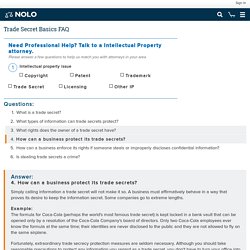
Talk to a Intellectual Property attorney. Please answer a few questions to help us match you with attorneys in your area. Case Details Contact Info show all options How can a business protect its trade secrets? Questions: 4 Reasons Entrepreneurs Need to Know About the New Trade Secrets Law. On April 27, 2016 Congress passed the Defend Trade Secrets Act (“DTSA”) which President Obama will soon sign into law.
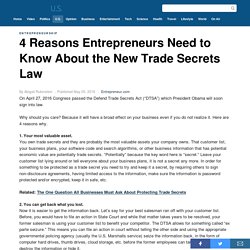
Why should you care? Because it will have a broad effect on your business even if you do not realize it. Here are 4 reasons why. 1. Your most valuable asset. You own trade secrets and they are probably the most valuable assets your company owns. Related: The One Question All Businesses Must Ask About Protecting Trade Secrets 2. Now it is easier to get the information back. Related: The Balancing Act: Sharing Data Versus Guarding Trade Secrets 3. Your competitors can use the DTSA against you. Related: Is Your Company's Data Safe in the Cloud? How to Protect Your Trade Secrets. When it comes to intellectual property, or IP, many people's knowledge begins and ends with patents, which grant inventors exclusive commercial use of their creations.
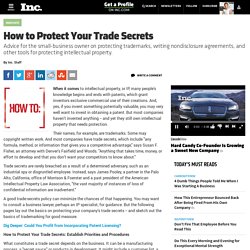
And, yes, if you invent something potentially valuable, you may very well want to invest in obtaining a patent. But most companies haven't invented anything -- and yet they still own intellectual property that needs protection. Their names, for example, are trademarks. Some may copyright written work. And most companies have trade secrets, which include "any formula, method, or information that gives you a competitive advantage," says Susan F. Trade secrets are rarely breached as a result of a determined adversary, such as an industrial spy or disgruntled employee. A good trade-secrets policy can minimize the chances of that happening. Dig Deeper: Could You Profit from Incorporating Patent Licensing? How to Protect Your Trade Secrets: Establish Priorities and Procedures. Patents - Small Business Encyclopedia.
Definition: A form of protection that provides a person or legal entity with exclusive rights for making, using or selling a concept or invention and excludes others from doing the same for the duration of the patent .
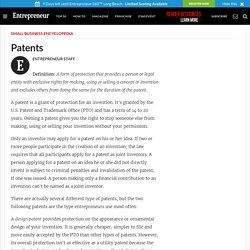
A patent is a grant of protection for an invention. It's granted by the U.S. Patent and Trademark Office (PTO) and has a term of 14 to 20 years. Owning a patent gives you the right to stop someone else from making, using or selling your invention without your permission. Only an inventor may apply for a patent on his or her idea. There are actually several different type of patents, but the two following patents are the type entrepreneurs use most often: A design patent provides protection on the appearance or ornamental design of your invention. To receive a design patent, your invention must pass these tests: It must have a new, original and ornamental design.The novel features of your design must not be obvious. Statutory-class test. To Patent or Not to Patent? - Entrepreneur.com. When it comes to inventing, the very first thing you need to do is protect your idea before anyone can steal it, right?
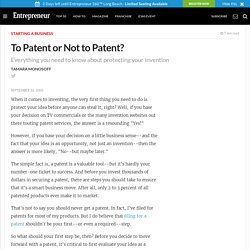
Well, if you base your decision on TV commercials or the many invention websites out there touting patent services, the answer is a resounding "Yes! " However, if you base your decision on a little business sense--and the fact that your idea is an opportunity, not just an invention--then the answer is more likely, "No--but maybe later. " The simple fact is, a patent is a valuable tool--but it's hardly your number-one ticket to success. And before you invest thousands of dollars in securing a patent, there are steps you should take to ensure that it's a smart business move. After all, only 2 to 3 percent of all patented products ever make it to market.
That's not to say you should never get a patent. So what should your first step be, then? So before applying for a patent, thoroughly consider the following factors: